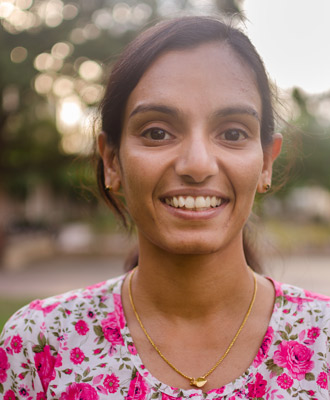
Chandni U
“I did my first condensed matter physics experiment, and discovered how much I enjoyed the whole process—the hands-on aspect of preparing your own samples, collaborating across disciplines with materials scientists, and looking at the properties of new materials where you really don’t know what you’re going to find. All of that appealed to me.”
- Research Associate, Indian Institute of Science, Bangalore
- Alumni, IQIM Postdoctoral Scholar in Physics
- PhD, 2012
- Indian Institute of Science, Bangalore
Interview
I’m studying graphene, a unique material made up of a single layer of carbon atoms. It conducts heat and electricity very well and is the thinnest and strongest material we know of, so it has many potential applications. It has many other bizarre and intriguing properties, and the scientists who were the first to prepare it in a single layer and describe some of its unusual characteristics won the 2010 Nobel Prize in physics. My experiments focus on how electrons move and interact in graphene, a phenomenon we don’t understand very well. We’d like to know whether their behavior is correlated—in other words, if you have electron movement over here, does it affect what electrons are doing over there, and how do the electrons influence each other across these distances? This is fundamental physics research, but gaining a deeper understanding of graphene’s electrical properties will also help us to envision and develop applications.
In high school I knew that I wanted to study physics, and in college I was originally attracted to astrophysics and quantum field theory—you know, you read popular science books and everyone wants to be Feynman! But soon after I started my master’s program at IISc I did my first condensed matter physics experiment, and discovered how much I enjoyed the whole process—the hands-on aspect of preparing your own samples, collaborating across disciplines with materials scientists, and looking at the properties of new materials where you really don’t know what you’re going to find. All of that appealed to me.
Back in Bangalore I was very active with a program called Notebook Drive that creates educational opportunities for underprivileged children. We teach in the primary schools and provide them with books, take students on science field trips, and organize other activities to encourage them to stay in school. After getting my PhD I spent several months working on a project jointly funded by the Indian government and the Bill and Melinda Gates Foundation to develop a lab-on-a chip diagnostic device for use in rural India. Since coming to Caltech, I’ve been involved in Caltech OASIS (Organization of Associated Students of the Indian Subcontinent). I like hiking, reading contemporary fiction, and cooking—traditional Indian and a bit of Italian.I was surprised to find that most people don’t cook so much here. After a long day in the lab, it’s like a form of relaxation for me.